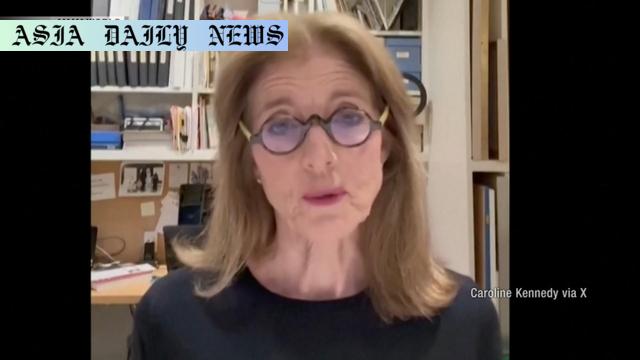Health Secretary – Caroline Kennedy urges senators to reject Robert F. Kennedy Jr.’s nomination, citing his lack of qualifications and dangerous vaccine views.
- Caroline Kennedy strongly opposes Robert F. Kennedy Jr.’s nomination for health secretary.
- She reasons that he lacks critical government or medical qualifications.
- RFK Jr.’s controversial anti-vaccine stance raises significant concerns.

Introduction: Caroline Kennedy Speaks Out
Caroline Kennedy, daughter of late US President John F. Kennedy and former US Ambassador to Japan, has expressed deep concern over the nomination of her cousin, Robert F. Kennedy Jr., for the position of health secretary. Recently, President Donald Trump put forth Robert F. Kennedy Jr.’s name to lead the Department of Health and Human Services, causing a stir within political and public health circles. Caroline Kennedy now urges the US Senate to reject this nomination, citing her cousin’s lack of qualifications and controversial views on vaccines.
Qualifications Under Question
In a letter sent to US senators, Caroline Kennedy shed light on Robert F. Kennedy Jr.’s inexperience in government administration and healthcare management. She underlined that overseeing agencies tasked with protecting public health is an enormous responsibility. In her opinion, Robert F. Kennedy Jr. does not possess the experience necessary to adequately fulfill the role. As a long-standing public figure with experience as the US Ambassador to Japan, Caroline Kennedy referenced her knowledge of bureaucratic functions, stating that RFK Jr. lacked the professional foundation for such a critical role in government.
Controversial Vaccine Views
One of Caroline Kennedy’s primary concerns is Robert F. Kennedy Jr.’s position on vaccines. Known for his anti-vaccine rhetoric, RFK Jr. has questioned the safety of vaccines, linking them to unproven claims such as autism. These opinions have drawn widespread criticism, including from the scientific and medical communities, which argue that such views undermine trust in vaccines. Caroline Kennedy emphasized that RFK Jr.’s vaccine stance is “willfully misinformed” and could have a detrimental impact on public health policies if he were to assume the health secretary position.
The Role of the Health Secretary
The US Department of Health and Human Services oversees a range of programs critical to public well-being, including Medicare, Medicaid, the Centers for Disease Control and Prevention (CDC), and the National Institutes of Health (NIH). The health secretary plays a key role in shaping and implementing health-related initiatives and policies. Given the ongoing challenges posed by global pandemics, public health crises, and regulatory needs, the position requires considerable expertise and sound judgment. Critics like Caroline Kennedy argue that Robert F. Kennedy Jr., without sufficient background in public health or administrative management, is ill-equipped for the task.
Political Implications
Caroline Kennedy’s opposition to RFK Jr.’s nomination carries significant political weight. As a member of one of America’s most prominent political families, her stance reveals deep divisions within the Kennedy family itself. It also reflects the broader societal debate about public health leadership, particularly at a time when the nation faces polarized views on science, health measures, and political appointments. President Trump’s nomination of RFK Jr. appears to be a polarizing choice, sparking both acceptance and vehement opposition.
A Historic Moment of Rejection
Caroline Kennedy’s public rejection of her cousin’s nomination demonstrates that familial loyalty may take a backseat to larger public and policy concerns. Her willingness to openly critique Robert F. Kennedy Jr. signals the importance of qualifications and integrity in leadership positions. The Senate’s decision on this nomination could serve as a historic moment, setting the tone for future appointments to high-profile public health positions.
Conclusion: A Divided Family, A Nation Watching
As the confirmation hearings loom, the spotlight remains on Caroline Kennedy’s bold stance against Robert F. Kennedy Jr.’s nomination for health secretary. Her criticisms highlight the need for experienced, scientifically-driven leaders in public health roles, particularly in a nation still grappling with the aftermath of the COVID-19 pandemic. The ultimate decision now lies with the Senate, but the nation’s citizens are closely watching—awaiting a verdict that could influence not only health policies but also public trust in leadership decisions.



Commentary
Caroline Kennedy’s Courageous Stand
Caroline Kennedy’s bold step in opposing her cousin Robert F. Kennedy Jr.’s nomination reflects not just familial division but a broader statement about the importance of qualifications in public health leadership. It is rare to see such candid critique within a prominent political family, and her actions bring attention to the greater responsibility needed when appointing individuals to critical roles like the health secretary.
The Complex Role of a Health Secretary
The role of the Department of Health and Human Services is pivotal, especially in a time when trust in scientific institutions is fragile. From combating pandemics to ensuring the safety of public health policies, the health secretary must be both knowledgeable and pragmatic. Caroline Kennedy’s concerns about Robert F. Kennedy Jr.’s suitability highlight a critical point—such positions cannot be filled based on notoriety or heritage alone. As she rightly pointed out, these significant roles require individuals with expertise and an unwavering commitment to evidence-based decisions.
The Vaccine Debate
Robert F. Kennedy Jr.’s controversial views on vaccines further complicate his nomination. Anti-vaccine rhetoric has already caused widespread damage, fueling misinformation and distrust within communities. A leader with such views in one of the highest public health offices could exacerbate this divide, potentially undoing years of progress in vaccine advocacy. Caroline Kennedy’s decision to confront these issues head-on demonstrates her commitment to protecting public health, even at the expense of her family’s unity.
Conclusion: Choosing Integrity Over Loyalty
Ultimately, Caroline Kennedy’s opposition serves as a reminder of the importance of prioritizing qualifications and public responsibility over personal or political ties. Her actions are both courageous and necessary, setting a high bar for accountability in public health leadership. Regardless of the Senate’s decision, Caroline Kennedy has made an undeniable impact by voicing her concerns, ensuring that public trust remains at the forefront of this critical debate.